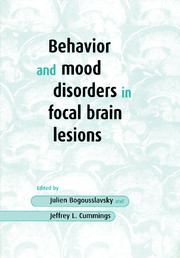Book contents
- Frontmatter
- Dedication
- Contents
- List of contributors
- Preface
- Acknowledgments
- 1 Emotional consequences of focal brain lesions: an overview
- 2 The evaluation of mood and behavior in patients with focal brain lesions
- 3 Methodological issues in studying secondary mood disorders
- 4 Emotional behavior in acute brain lesions
- 5 Depression and lesion location in stroke
- 6 Mood and behavior in disorders of the basal ganglia
- 7 Mania and manic-like disorders
- 8 Behavioral and emotional changes after focal frontal lobe damage
- 9 Disorders of motivation
- 10 Thalamic behavioral syndromes
- 11 Obsessive-compulsive disorders in association with focal brain lesions
- 12 Emotional dysprosody and similar dysfunctions
- 13 Temporal lobe behavioral syndromes
- 14 Neural correlates of violent behavior
- 15 Focal lesions and psychosis
- 16 Alterations in sexual behavior following focal brain injury
- 17 Anosognosia
- 18 Acute confusional states and delirium
- Index
4 - Emotional behavior in acute brain lesions
Published online by Cambridge University Press: 05 August 2016
- Frontmatter
- Dedication
- Contents
- List of contributors
- Preface
- Acknowledgments
- 1 Emotional consequences of focal brain lesions: an overview
- 2 The evaluation of mood and behavior in patients with focal brain lesions
- 3 Methodological issues in studying secondary mood disorders
- 4 Emotional behavior in acute brain lesions
- 5 Depression and lesion location in stroke
- 6 Mood and behavior in disorders of the basal ganglia
- 7 Mania and manic-like disorders
- 8 Behavioral and emotional changes after focal frontal lobe damage
- 9 Disorders of motivation
- 10 Thalamic behavioral syndromes
- 11 Obsessive-compulsive disorders in association with focal brain lesions
- 12 Emotional dysprosody and similar dysfunctions
- 13 Temporal lobe behavioral syndromes
- 14 Neural correlates of violent behavior
- 15 Focal lesions and psychosis
- 16 Alterations in sexual behavior following focal brain injury
- 17 Anosognosia
- 18 Acute confusional states and delirium
- Index
Summary
Introduction
Little is known about the emotional and related behavioral changes in acute focal lesions, although they may be associated with specific prognostic correlates. Although already recognized by Bleuler in 1924, depression and, more generally, mood disorders following cerebral lesions have been studied systematically only during the last 20 years. The initial studies of emotional disorders following brain injuries included patients with various lesions such as surgical incisions, traumatic closed head injuries, penetrating head injury, and stroke, making it difficult to determine the location of the lesion in each case. For this methodological reason, the most precise evaluation of mood disorders following acute brain lesion has been made in stroke studies. Although these studies suggest a critical role of the anterior left hemisphere in depression, some authors deny a causal contribution of lesion location to depression. The predominant role of the right hemisphere in secondary mania is well recognized, but a consensus is still lacking and further studies are needed to determine the clinico-topographic correlation of disorders such as apathy, anxiety, catastrophic reaction, and pathological laughing and crying sometimes encountered after stroke. These affective disorders are important to consider in stroke patients, since they may negatively influence neurological recovery and may be responsive to treatment.
Specific emotional behaviors, such as disinhibition, denial, indifference, overt sadness, and aggressiveness, often occur during the days immediately following stroke. They can be overlooked if not searched for systematically with appropriately designed scales. Some of these early behaviors, such as denial, may be related to the late development of depression and anxiety. Prospective studies of mood changes during and immediately after strokehave not yet been performed. Such studies on large samples of patients may permit the delineation of which of these acute emotional behavioral changes are markers for the delayed development of emotional disturbances.
Some stroke subtypes, such as cardioembolic stroke, may have a specific pattern of early emotional behavior. Stroke occurrence itself may be related to an individual vulnerability different from that of stress, as in carotid artery disease.
In stroke, early disregard of the symptoms by patients or their relatives may delay consultation and compromise acute management with new developing techniques, such as thrombolysis. Even after improvement, some patients with denial may require considerable persuasion to enrol in stroke prevention therapy or be reluctant to accept rehabilitation.
- Type
- Chapter
- Information
- Behavior and Mood Disorders in Focal Brain Lesions , pp. 65 - 94Publisher: Cambridge University PressPrint publication year: 2000
- 5
- Cited by



